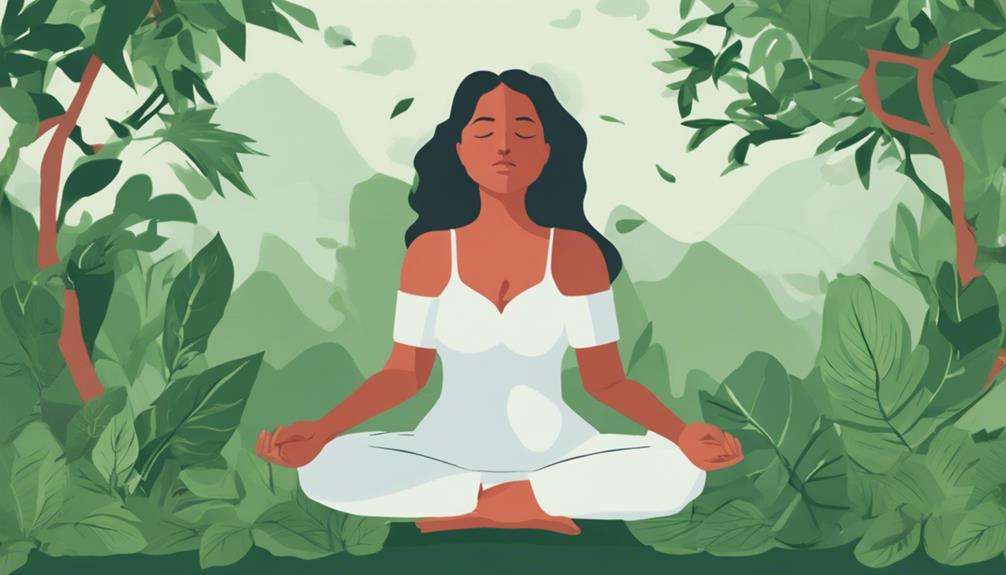If you've been searching for a gentle and effective way to manage your blood pressure without relying solely on medication, consider exploring how meditation can naturally assist you in this endeavor.
The practice of meditation offers a holistic approach to reducing blood pressure levels that goes beyond just relaxation. By incorporating mindfulness techniques, breathing exercises, and specific yoga poses into your routine, you can tap into the power of your mind to positively impact your cardiovascular health.
Discover the simple yet profound ways meditation can support your journey towards achieving perfect blood pressure levels and overall well-being.
Key Takeaways
- Meditation lowers blood pressure by activating the relaxation response and reducing stress levels.
- Mindfulness practices effectively manage hypertension by decreasing systolic and diastolic readings.
- Breathing techniques like deep breathing aid in natural blood pressure reduction.
- Yoga poses and meditation offer holistic approaches for stress reduction and healthy blood pressure maintenance.
Benefits of Meditation for Blood Pressure
Through meditation, individuals can experience various benefits that contribute to the reduction of blood pressure levels. Research suggests that meditation and mindfulness practices play a critical role in lowering elevated blood pressure, particularly in individuals with hypertension. By engaging in meditation, individuals can activate the relaxation response, which helps in reducing stress levels and promoting relaxation. This, in turn, leads to improvements in both systolic and diastolic blood pressure readings. Additionally, the calming effects of meditation positively impact cardiovascular health by reducing the strain on the heart and blood vessels.
One significant aspect of meditation is its ability to manage stress, a key contributor to elevated blood pressure. The relaxation response induced by meditation techniques aids in widening blood vessels, improving blood flow, and decreasing inflammation, all of which are essential for maintaining the best blood pressure levels. Elderly individuals, in particular, have shown promising results in managing their blood pressure through regular meditation practices, emphasizing the importance of incorporating mindfulness techniques for overall cardiovascular well-being.
Mindfulness Practices for Hypertension
Mindfulness practices, when consistently implemented, demonstrate a significant potential for effectively managing hypertension by reducing blood pressure levels in individuals with this condition.
Mindfulness meditation, a key component of mindfulness practices, has been shown in studies to lead to notable decreases in both systolic and diastolic blood pressure readings.
By focusing on present moment awareness, mindfulness-based interventions have proven to be effective in managing high blood pressure and enhancing overall cardiovascular health.
These techniques involve cultivating nonjudgmental attention towards thoughts and bodily sensations, aiding in stress reduction and blood pressure control.
Incorporating mindfulness practices into your daily routine can complement traditional treatments for hypertension, contributing to improved well-being.
Embracing mindfulness for hypertension offers a holistic approach that targets not only the physical aspects of high blood pressure but also the mental and emotional factors that can impact blood pressure levels.
Breathing Techniques to Reduce BP

Utilizing specific breathing techniques has been shown to effectively reduce blood pressure levels by promoting relaxation and triggering the body's relaxation response. Deep breathing, such as diaphragmatic breathing, can play an important role in lowering blood pressure naturally.
By focusing on slow, deep breaths, you can improve oxygen circulation, calm your mind, and reduce stress, all of which contribute to managing high blood pressure. Long exhalations during these breathing exercises are particularly beneficial as they help engage the parasympathetic nervous system, further aiding in blood pressure reduction.
Consistent practice of these breathing techniques is key to reaping their benefits in managing and reducing high blood pressure. By incorporating breathing exercises into your daily routine, you can establish a natural way to support your cardiovascular health.
These techniques offer a simple yet powerful method to enhance relaxation and support overall well-being, making them a valuable addition to your hypertension management plan.
Yoga Poses for Lowering Blood Pressure
Incorporating specific yoga poses into your routine can effectively contribute to lowering blood pressure levels through controlled breathing and gentle movements that promote relaxation and stress reduction. Yoga, with its focus on controlled breathing and mindfulness, has been shown to have positive effects on blood pressure.
Poses like Savasana (Corpse Pose) and Balasana (Child's Pose) are particularly beneficial for reducing blood pressure. These poses encourage relaxation and help in calming the mind and body, which can lead to a decrease in stress levels.
Additionally, yoga poses that involve stretching, twisting, and gentle inversions can improve circulation and support cardiovascular health, which are important factors in managing blood pressure. Regular practice of yoga, along with other lifestyle changes, can be a holistic approach to maintaining healthy blood pressure levels over time.
Consider adding these yoga poses to your daily routine to complement your efforts in reducing blood pressure naturally.
Holistic Approaches With Meditation

To further explore the management of blood pressure through holistic approaches, meditation stands out as a natural and effective method supported by scientific evidence for its significant impact on reducing blood pressure levels.
High blood pressure, also known as hypertension, is a major risk factor for heart disease and stroke. Incorporating meditation techniques such as mindfulness and transcendental meditation into your daily routine can help lower both systolic and diastolic blood pressure readings.
Studies have shown that regular practice of meditation not only reduces blood pressure but also improves heart rate variability, indicating better cardiovascular health. The relaxation and stress-reducing effects of meditation play an important role in managing high blood pressure.
Frequently Asked Questions
Can I Lower Blood Pressure Through Meditation?
You can effectively lower blood pressure through meditation. Meditation benefits the mind-body connection, reduces stress, and improves heart health. By practicing mindfulness techniques and deep breathing regularly, you can manage blood pressure levels and enhance overall well-being.
How Can I Lower My Blood Pressure Naturally?
Lower your blood pressure naturally through various methods. Incorporate herbal remedies, breathing techniques, stress management, mindfulness practices, physical activity, dietary changes, relaxation techniques, acupuncture therapy, aromatherapy benefits, and yoga poses into your routine for best results.
What Is the Holistic Approach to Hypertension?
In managing hypertension holistically, prioritize diet changes, stress management, exercise routines, and lifestyle modifications. Incorporate herbal remedies, mind-body connection, breathing techniques, mindfulness practices, acupuncture therapy, and holistic healing for thorough blood pressure control.
How Can I Lower My Blood Pressure With My Mind?
To lower your blood pressure with your mind, focus on the mind-body connection. Use relaxation techniques, breath awareness, and mindfulness practice. Reduce stress, enhance mental focus, and regulate emotions through visualization exercises, guided imagery, and inner calmness for better cardiovascular health.
Conclusion
To sum up, meditation is a natural and effective way to reduce blood pressure levels and improve overall cardiovascular health. By practicing mindfulness, breathing techniques, and yoga poses, individuals can experience significant benefits in managing hypertension.
It's ironic that something as simple as calming the mind can have such a profound impact on blood pressure.
Embracing holistic approaches with meditation can lead to a healthier and more balanced lifestyle.






